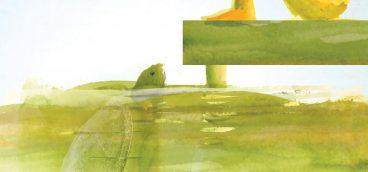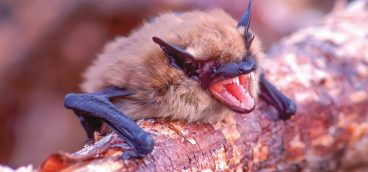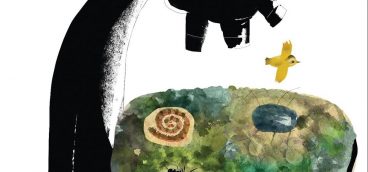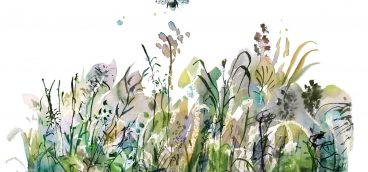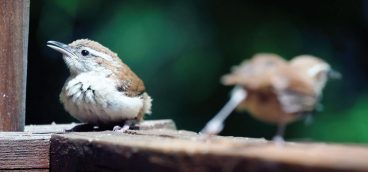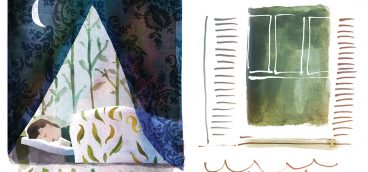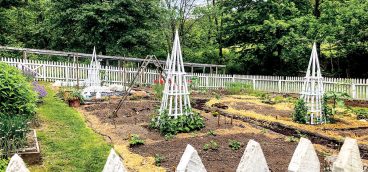What Would Rachel Carson Say?
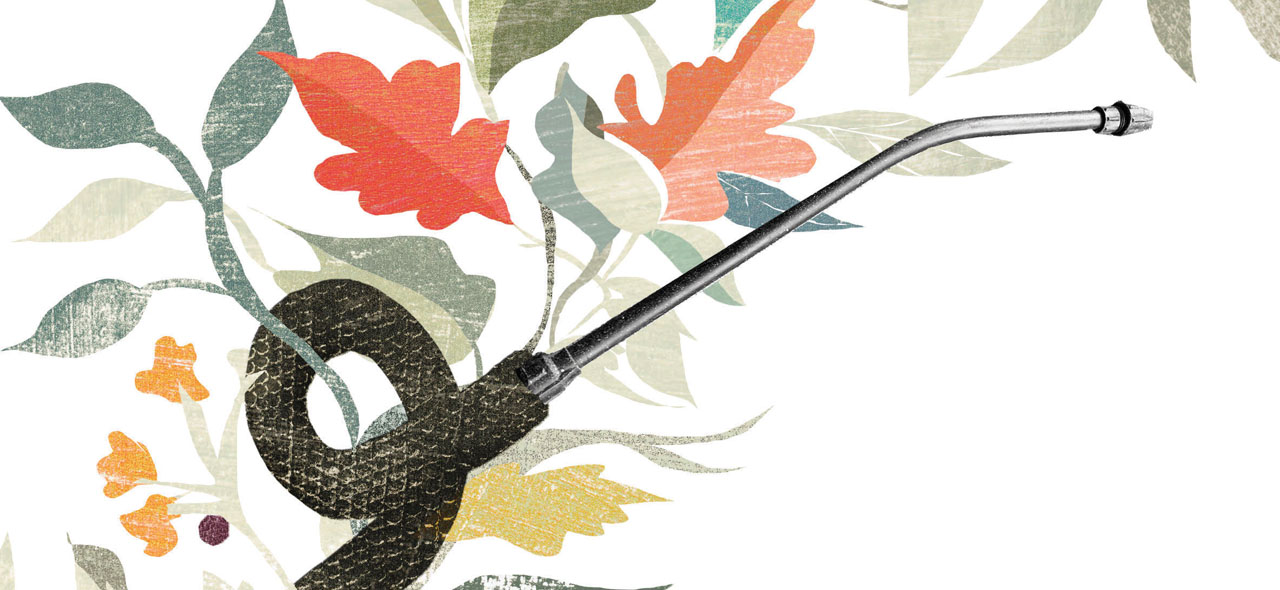
Illustration by Stacy Innerst.
November 20, 2023
On a Tuesday morning late last August, I turned out of my driveway onto Route 711 to drive into Ligonier. Route 711 is a two-lane state road, a main north-south corridor, designated as the Laurel Highlands Scenic Byway. I passed, heading in the other direction, two large white trucks, one of which had a long wand spraying a mist of chemicals into trees along the road: maple, oak, pine, spruce, catalpa, walnut and others.
I had noticed already the results of spraying in Pennsylvania: a huge brown swath of dead vegetation along the east-west road that runs through my town — Route 30 or the famous Lincoln Highway, America’s first transcontinental highway. And I’ve seen masses of brown vegetation along the Pennsylvania Turnpike. Now my road was being hit with herbicides.
WHAT WOULD RACHEL CARSON SAY?
“There is a steadily growing chorus of outraged protest about the disfigurement of once beautiful roadsides by chemical sprays, which substitute a sere expanse of brown, withered vegetation for the beauty of fern and wildflower, of native shrubs adorned with blossom or berry.”
Rachel Carson spent her childhood on the other side of Pittsburgh about 50 miles from here. She lived, as I do now, in a white 19th-century farmhouse with a springhouse and a grape arbor. But there our commonality ends. She was arguably the most influential environmentalist of the 20th century. I am simply one who admires her book, Silent Spring, published in 1962 — and not just because it led to the ban of DDT, but because Carson wrote about science in such a poetic way.
Sixty-one years later, we are still spraying chemicals along roadsides in the state where Carson was born.
WHAT WOULD RACHEL CARSON SAY?
“Hedgerows along country roads and bordering fields provide food, cover, and nesting areas for birds and homes for many wild animals. … Such vegetation is also the habitat of wild bees and other pollinating insects. Man is more dependent on these wild pollinators than he usually realizes.”
I called Pennsylvania’s Department of Transportation (PennDOT) and was told by a district roadside specialist that they’re allowed to spray due to a June 1945 State Highway Law. PennDOT conducts three herbicide programs, which, according to their Herbicide Use Position paper, are “to maintain a safe travel way that is free from obstructing vegetation.” Their literature states they have 150,000 acres of right of way to maintain and serve 12 million people with different opinions. “The Department of Transportation seeks understanding and support for this program.”
One of those three state programs was in progress on my road that day. A company subcontracted by PennDOT was spraying what the roadside specialist called “a bud inhibitor,” which prevents buds from forming on trees the next season. He sent me the chemical company fact sheet that states: “Only protected handlers may be in the area during application,” and agricultural workers are not to enter “into treated areas during the restricted entry interval (REI) of 12 hours.”
We were not informed that our road was to be sprayed. How do we know, then, to stay out of the area during spraying, or for 12 hours afterward? We might have been walking in a field that borders Route 711. My husband had just mowed around the perimeter. For years we had cows there. On another property, a child might be playing ball on a front lawn.
There is no way to let everyone know, the roadside specialist said. What about putting notices in the newspaper or a public service announcement on the radio, I suggested? Impossible, he said. What about social media, telephone calls, a movable neon sign, a megaphone? (Somehow politicians manage to reach me by telephone and mass mailings every election year.) Because I have a right to know.
WHAT WOULD RACHEL CARSON SAY?
“If the Bill of Rights contains no guarantee that a citizen shall be secure against lethal poisons distributed either by private individuals or by public officials, it is surely only because our forefathers, despite their considerable wisdom and foresight, could conceive of no such problem.”
The chemical company recommends that handlers follow label directions to minimize spray drift because “this product may adversely impact the forage and habitat of local pollinators, including the monarch butterfly (and its larvae), birds, or bats if it reaches non-target areas.” I find it ironic that PennDOT recently issued a new license plate to raise money for a Pollinator Habitat Program Fund to “create naturalized gardens and meadows planted with pollinator-friendly species of flowering plants specifically for bees, butterflies, beetles, and other insects which may have been adversely affected by the loss of their native habitat.” And yet we spray herbicide that can harm pollinators?
I asked the roadside specialist if, instead of spraying, branches might be cut and weeds mown? Spraying saves a lot of money, he said, and is safer for his crews and motorists. PennDOT’s literature backs that up: “Herbicide use is more cost-effective than tree cutting or trimming.” He told me Pennsylvania uses the best chemicals and applies them judiciously, uses the best management practices, and puts out the best program they can to protect the driving public.
WHAT WOULD RACHEL CARSON SAY?
“It is cheaper than mowing, they cry. … So perhaps it appears in the neat rows of figures in the official books; but were the true costs entered … the wholesale broadcasting of chemicals would be seen to be more costly in dollars as well as infinitely damaging to the long-range health of the landscape and to all the varied interests that depend on it.”
Might I put a “NO SPRAY” sign on my property? Not in his district, he said. The only way they won’t spray is if homeowners maintain their properties properly. The literature states: “The Department may negotiate, on a case by case basis, a Vegetation Management Permit (M-688) whereby the abutting property owner would be responsible for vegetation control in return for the Department not using herbicide spraying. This permit would require an indemnification agreement supported by insurance in an amount sufficient to cover any Department liability.”
The literature states further that I may get additional information about pesticide safety from “the PA Dept of Environmental Protection located in Harrisburg at the Rachael (sic) Carson State Office Building.”
WHAT WOULD RACHEL CARSON SAY?
“Who has made the decision that sets in motion these chains of poisonings, this ever-widening wave of death that spreads out, like ripples when a pebble is dropped into a still pond?”
The roadside specialist told me we’d been on the phone for 43 minutes — I guess he was timing me — and that I was similar to only one of four people who usually call his office. I didn’t know what he meant. One in four people don’t yell at him, he said. I didn’t want to yell, I said; I just wanted to learn. We spoke for another 15 minutes, and while it was clear we had different opinions on this issue, I didn’t blame him. It’s not his fault; it’s the fault of the Commonwealth of Pennsylvania, which needs to figure out how to stop spraying chemicals along our roadways.
WHAT WOULD RACHEL CARSON SAY?
“The choice, after all, is ours to make. If, having endured much, we have at last asserted our ‘right to know,’ and if knowing, we have concluded that we are being asked to take senseless and frightening risks, then we should no longer accept the counsel of those who tell us that we must fill our world with poisonous chemicals; we should look about and see what other course is open to us.”
Let us not forget that section 127 of Pennsylvania’s constitution, drafted in 1967 shortly after Silent Spring was published, and ratified in 1971, states that, “The people have a right to clean air, pure water, and to the preservation of the natural, scenic, historic and esthetic values of the environment. Pennsylvania’s public natural resources are the common property of all the people, including generations yet to come. As trustee of these resources, the Commonwealth shall conserve and maintain them for the benefit of all the people.”
And it’s not just Pennsylvania. Montana youth just won a lawsuit that focused on that state’s constitution that guarantees residents “a clean and healthful environment in Montana for present and future generations.”
WHAT WOULD RACHEL CARSON SAY?
“… we must remain vigilant, we must continue to challenge and to question, we must insist that the burden of proof is on those who would use these chemicals to prove the procedures are safe.”
I love to walk the fields and forests of our Pennsylvania farm and I wanted to walk the 65 acres of fields and forests at the Rachel Carson Homestead in Springdale — where Carson’s mother taught her about the natural world. But there are no fields and forests left, just a little over ½ acre. Still, I was pleased to set my feet where hers had stepped, to imagine what her life there must have been like during the early part of the 20th century. The museum’s executive director told me that it was on this Pennsylvania property that Carson first developed her sense of wonder — the inspiration for her writing — and it is because of Carson’s words that the world owes her such gratitude.
What would Rachel Carson say about Pennsylvania’s roadside spraying in 2023? I think she’d turn the question on us: What kind of world are we leaving to our children?
Quotations from the work of Rachel Carson used by permission.


